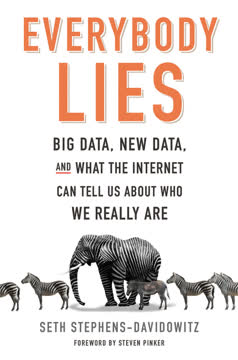重点摘要
1. 经济激励以意想不到的方式塑造人类行为
“传统智慧常常是错误的。”
激励至关重要。 人们对激励的反应并不总是显而易见或直观的。这适用于生活的各个方面,从育儿到政治再到商业。例如:
- 教师在标准化考试中作弊以提高学校的表现
- 相扑选手故意输掉比赛以帮助其他选手
- 房地产经纪人以高于客户的价格出售自己的房屋
关键在于识别任何特定情况下真正的激励因素。通常,看似利他或不理性的行为可以通过隐藏的经济动机来解释。
2. 传统智慧常常忽视隐藏的原因和结果
“知道该测量什么以及如何测量,可以使复杂的世界变得简单得多。”
质疑假设。 许多广泛接受的社会现象解释基于表面的相关性或直觉,而非严谨的分析。通过应用经济思维和数据分析,我们可以揭示出令人惊讶的真相:
- 1970年代堕胎合法化导致1990年代犯罪率显著下降
- 游泳池对儿童的危险性高于枪支
- 增加警察存在比延长监禁时间更有效地减少犯罪
挑战传统智慧需要仔细审查数据,并愿意考虑非常规的解释。
3. 数据分析揭示了社会问题的反直觉真相
“道德代表人们希望世界运作的方式,而经济学则代表世界实际运作的方式。”
超越表面解释。 通过分析大型数据集并应用经济原则,我们可以揭示隐藏的模式和因果关系,挑战我们对社会问题的先入之见:
- 学校选择对学生成就的真实影响
- 竞选支出在政治选举中的有限效果
- 教养方式在决定儿童结果中的作用
数据驱动的分析常常揭示出常见的解决方案可能无效甚至适得其反,而被忽视的因素可能产生重大影响。
4. 作弊和欺诈比我们想象的更普遍
“如果你不作弊,那你就不够努力。”
不诚实的激励。 作弊和欺诈在生活的许多领域中发生,往往以微妙的方式难以察觉。例如:
- 教师篡改学生考试成绩以提高学校排名
- 相扑选手操纵比赛以维持排名
- 在线约会者虚假陈述自己以显得更具吸引力
理解驱动不诚实行为的激励因素可以帮助设计更好的系统和政策以防止此类行为。然而,重要的是要认识到,在任何系统中,某种程度的作弊可能是不可避免的。
5. 政策和社会中的意外后果的力量
“传统智慧常常是错误的。”
二次效应至关重要。 出于良好意图的政策和行动往往会产生意想不到的后果,这些后果可能会削弱其原始目标或产生新问题:
- 安全带法律导致更鲁莽的驾驶和行人死亡
- 禁毒政策增加暴力犯罪和监狱人口
- 最低工资的提高可能减少低技能工人的就业机会
认识到意外后果的潜力对于有效的政策制定和理解复杂的社会系统至关重要。
6. 创造性解决方案可以应对复杂的社会经济问题
“问题的答案取决于如何表述。”
跳出框架思考。 通过从经济角度看待问题并考虑非常规解决方案,我们可以找到创新的方法来解决社会问题:
- 通过奖励学生好成绩来提高学业表现
- 使用经济激励来鼓励器官捐赠
- 实施拥堵收费以减少城市交通
创造性的问题解决往往涉及重新思考激励机制,并挑战传统的政策和社会干预方法。
7. 经济学为理解人性提供了独特的视角
“任何人突然消失的最可能结果是他的家人和朋友会认为他与另一位女性在一起。”
经济人假说。 经济原则可以帮助解释广泛的人类行为和社会现象:
- 约会和人际关系的经济学
- 人们为何选择特定职业或生活方式
- 社会规范和文化实践如何随时间演变
通过将经济思维应用于日常情况,我们可以获得对人性和社会动态的新见解。
8. 信息不对称影响市场和决策
“信息是互联网的货币。一般来说,你提供的信息越多,你就越有价值。”
知识就是力量。 各方之间的信息差异对市场和个人决策有重大影响:
- 专业知识在医学和法律等职业中的作用
- 在线评论和评分如何影响消费者行为
- 透明度对商业实践和政府政策的影响
理解和解决信息不对称可以导致更高效的市场和更好的决策。
9. 社会规范和文化因素影响经济结果
“传统智慧常常是错误的。”
文化至关重要。 经济行为受到社会规范、文化价值观和地方习俗的影响:
- 小费习惯在不同国家和行业的差异
- 宗教信仰对经济发展的影响
- 文化对风险的态度如何影响创业和创新
认识到经济学与文化之间的相互作用对于理解全球市场和在不同社会中设计有效政策至关重要。
最后更新日期:
FAQ
What's When to Rob a Bank about?
- Exploring Economic Concepts: The book delves into economic principles using unconventional and humorous anecdotes, illustrating how these theories apply to everyday life.
- Cheating and Incentives: It examines the prevalence of cheating across various fields and how incentives shape human behavior, suggesting that understanding these can lead to better decision-making.
- Challenging Conventional Wisdom: The authors challenge widely held beliefs by presenting data and alternative viewpoints, encouraging readers to question societal norms.
Why should I read When to Rob a Bank?
- Engaging and Informative: Written in a witty style, the book makes complex economic concepts accessible and enjoyable, appealing to a broad audience.
- Real-World Applications: It provides insights into how economic principles affect daily life, offering practical examples that illustrate the relevance of economics.
- Thought-Provoking Ideas: The authors encourage critical thinking about societal norms and policies, prompting reflection on issues like education, crime, and environmentalism.
What are the key takeaways of When to Rob a Bank?
- Incentives Matter: A central theme is that people's behavior is heavily influenced by the incentives they face, which can help predict and explain actions.
- Cheating is Common: The book highlights the prevalence of cheating, driven by incentives, challenging the notion of inherent honesty.
- Questioning Assumptions: Readers are urged to question conventional wisdom and consider alternative explanations for observed phenomena.
What are the best quotes from When to Rob a Bank and what do they mean?
- “If you’re not cheating, you’re not trying.”: This reflects the view that bending rules is often seen as necessary in competitive environments.
- “The best ideas often sound crazy at first.”: Emphasizes the importance of innovation and suggests that many successful concepts were initially dismissed.
- “Humans tend to overestimate small probabilities.”: Highlights a cognitive bias where people fear unlikely events more than they should, urging rational risk assessment.
How does When to Rob a Bank challenge conventional wisdom?
- Critique of Policies: The authors question the effectiveness of various policies by presenting data that contradicts popular beliefs, encouraging reevaluation.
- Behavioral Economics Insights: The book shows how cognitive biases lead people to act against their best interests, challenging the assumption of rational decision-making.
- Real-World Examples: Through anecdotes, the authors illustrate how conventional wisdom can lead to poor outcomes, highlighting the need for critical thinking.
How does When to Rob a Bank relate to behavioral economics?
- Decision-Making Under Pressure: The book illustrates how stress can lead to irrational decisions, a key focus of behavioral economics.
- Incentives and Behavior: It emphasizes the role of incentives in shaping behavior, aligning with the idea that people respond to rewards and punishments.
- Real-World Examples: Scenarios like bank robberies and sports decisions demonstrate behavioral economic principles in action.
What role does data play in When to Rob a Bank?
- Evidence-Based Arguments: The authors use data to support their claims and challenge assumptions, enhancing the credibility of their arguments.
- Analyzing Trends: Statistical analysis is used to uncover patterns in fields like education and crime, helping readers understand complex issues.
- Encouraging Skepticism: By presenting data that contradicts popular beliefs, the authors promote a more analytical mindset when evaluating information.
How does When to Rob a Bank address the topic of cheating?
- Prevalence of Cheating: Cheating is shown as a common response to misaligned incentives, occurring in education, sports, and business.
- Incentives and Consequences: The structure of incentives often leads individuals to cheat, with little regard for ethics.
- Cultural Acceptance: In some contexts, cheating is normalized, reflecting broader cultural attitudes towards competition.
What are some surprising findings in When to Rob a Bank?
- Walking Drunk is Dangerous: Walking while intoxicated is revealed to be more dangerous than driving drunk, challenging common perceptions.
- Impact of High Gas Prices: High gas prices can lead to positive environmental outcomes, such as reduced driving, highlighting economic behavior's complexity.
- Endangered Species Act Consequences: The Act may inadvertently lead to habitat destruction, questioning the effectiveness of certain environmental policies.
What concepts in When to Rob a Bank are most important?
- Loss Aversion: People are more motivated to avoid losses than to achieve gains, influencing decision-making.
- Statistical Discrimination: Biases affect economic outcomes, particularly in online marketplaces where race impacts sales.
- Behavioral Economics: The book explains why people often make irrational choices, especially under pressure.
How do Levitt and Dubner use humor in When to Rob a Bank?
- Witty Anecdotes: Humorous stories make complex economic concepts more relatable and engaging.
- Playful Language: A lighthearted tone helps demystify serious topics, making the book enjoyable.
- Satirical Observations: Satire is used to critique societal norms, encouraging critical thinking.
What methods do Levitt and Dubner use to present their arguments in When to Rob a Bank?
- Data Analysis: Statistical evidence supports claims about crime and economics.
- Field Experiments: Real-world experiments test hypotheses, providing empirical evidence.
- Narrative Storytelling: Compelling narratives illustrate economic principles, making content accessible.
评论
《何时抢银行》的评价褒贬不一,评分从1星到5星不等。许多读者认为这本书既有趣又发人深省,赞扬其涵盖的广泛主题和非传统视角。然而,批评者认为书籍缺乏深度和连贯性,更像是一系列博客文章的集合,而非一部完整的作品。一些人欣赏书籍的格式,认为易于阅读,而另一些人则觉得内容肤浅且缺乏联系。作者的写作风格和幽默感普遍受到好评,但也有读者认为内容过于随机或研究不够深入。
Freakonomics Series
Similar Books
















